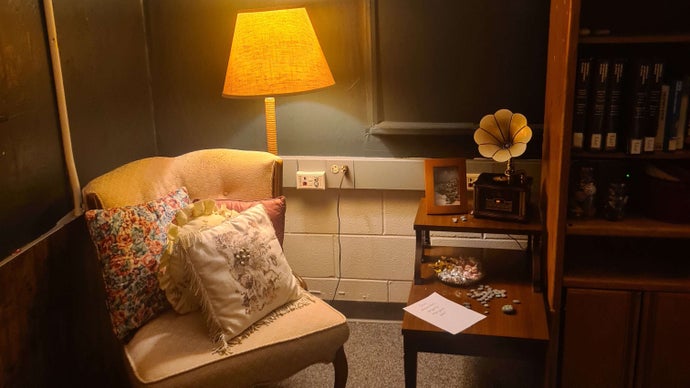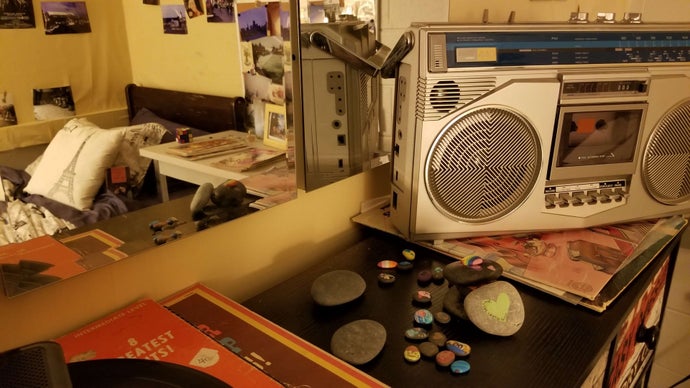Hello! Eurogamer is once again marking Pride with another week of features celebrating the intersection of LGBTQIA+ culture and gaming in all its guises. Today, Florence Smith Nicholls explores experimental escape room Memoirscape and its tale of queer love in the 80s.
“This room is very gender.”
We’re in a teen bedroom – the exact location and date is a little hazy, but it’s somewhere in Queens, New York City, in 1986. All the hallmarks of adolescence are here, posters on the walls, a brightly covered duvet, knick-knacks. The space is bathed in warm light. I sit down on the bed and pick up a romance novel left nearby. It’s comfortable, one might even say cosy, but we’re not alone. Another group is huddled around a cassette player, listening to a recording of a private conversation between two young women. When I look closer at the photographs on the walls, some of the faces seem to be crossed out. Oh, and the novel is extremely gay.
This is Memoirscape, a self-styled ‘cosy escape room’ created as part of the Design of Interactive Experiences course at Massachusetts’ Worcester Polytechnic Institute. Its slightly sci-fi set-up casts players as participants in a live demonstration of Dr. Julia Adler’s work on interactive memories. For this particular experiment, they step into one of Adler’s own memories, exploring a happy summer she spent in her grandmother’s NYC apartment before heading off to college. Here, in an experience combining elements of immersive theatre and environmental storytelling, they’re free to interact with Adler’s childhood living room and bedroom as they please, learning more about her past – and her long-lost love – through the ephemera in each room. As Memoirscape’s website puts it,”Let your curiosity guide you, and notice the narrative unfold.”
Like other escape rooms, Memoirscape features puzzles to solve. Players are tasked with finding a series of cassette tapes and noting down corresponding letters to form a code, for instance, while other clues, such as a cryptic message on the TV, prompt them toward further solutions. Unlike traditional escape rooms, however, there’s no time limit and the “escape” is less literal; the ultimate goal is to work out how to help Dr. Adler by leaving the cosy living room behind, finding her office, and figuring out why she’s so fixated on reliving the summer of 1986. “It’s an experience, like childhood, you’ll eventually have to leave behind,” continues the official description. “How you choose to do so, what you do when you leave, and how you feel about your memory of it… that’s what’s up to you.” There are even four different endings, none of which diminish the player for not getting further.
Given Memoirscape’s billing as a space you can enter, soak up, and leave whenever you feel like, its sense of atmosphere is key – and its recreation of a cosily nostalgic corner of 1986 is certainly impressive. Memoirscape’s design is built on what its narrative and production consultant Katherine Crighton calls “asynchronous storytelling through ephemera” – inspired by Punchdrunk’s immersive experience Sleep No More and Henning Nelm’s 1969 handbook Magic and Showmanship – and, as someone who studies archaeological approaches to games, I was fascinated by this material culture.
The rooms that make up Dr. Adler’s memories of her grandmother’s apartment are stuffed with authentic 80s bric-a-brac, including carefully curated bookshelves and vintage board games. There are even 80s-style video games programmed specifically for the experience by Samin Shahriar Tokey using a Raspberry Pi and touchscreen. But amid all this richly authentic detail, there’s perhaps one element that truly gets to the heart of Memoirscape: the novel I mentioned back at the start, author Nancy Garden’s groundbreaking 1982 queer young adult love story, Annie on My Mind.

As Crighton tells me over email, Worcester Polytechnic Institute’s Interactive Media and Game Development program – which Memoirscape was created for – has a vibrant community of queer students, “and so the development of Julia Adler… into a young lesbian in 1986 was a definite ‘write what you know’ moment”. And woven between Memoirscape’s more familiar escape room elements is a queer love story that Annie on My Mind mirrors almost serendipitously. “As I started digging into the book to make sure it still fit within our cosy gameplay,” Crighton explains, “I discovered connection after connection with not just the characters our students had created, but our larger worldbuilding as well. After that, choosing to make the main thrust of Memoirscape be the love story between Julie and Steph, and the persistence of memory fueled by that love, felt like being given the key to a door we hadn’t realised could be opened.”
Indeed, Memoirscape’s very specific 80s nostalgia goes beyond mere aesthetics. On the path to uncovering Alder’s past, for instance, players use genuine, old-fashioned audio cassettes to gather clues – a process Crighton believes encourages them to “practice patience and mindfulness” as they interact with unfamiliar analogue technology. But its 1986 setting also creates a certain kind of tension for a queer person who might be nostalgic for the era, despite it being a less accepting period. I was disappointed but not surprised to discover Annie on My Mind has been the subject of controversy over the years, and even burnt in Kansas City in 1993 just because it’s a story about two young women in love.

Ultimately, Memoirscape invites a different kind of escapism beyond timed metrics, accommodating a range of playstyles to suit different tastes. For me, combing through its carefully curated period-appropriate books and ephemera was a joy, but other players might choose to simply hang out with their friends, play chess, and soak up its period atmosphere. Or they might opt to speedrun the puzzles and discover Adler’s secrets as quickly as possible. Without spoiling too much, the way to progress the story and find Dr Adler’s office is always hidden in plain sight and there’s nothing stopping players from leaving and finding her lab, even Adler herself. In this way Memoirscape perhaps subverts one of the fundamental principles of escape rooms; it isn’t that players are prevented from leaving, they’re presented with a space so cosy they don’t want to leave.
Given Memoirscape’s emphasis on set design and exploration, it reminded me of video games with similar themes. An obvious parallel would be developer Fullbright’s walking simulator, Gone Home; as in that game’s tale of slowly unfurling familial revelations, Adler’s story is told as an epistolary narrative, allowing players to discover more at their own pace. I can’t help but wonder what it would look like if other games with rich environmental storytelling like Elden Ring created challenge through distraction rather than conflict. Just imagine if all the books in Elden Ring’s Raya Lucaria Academy were readable – it would certainly add a new kind of difficulty for the lore enthusiasts!
With the new wave of dark cosy games like Grave Seasons and Wanderstop upon us, it seems there is an appetite for experiences that question the comfort that they provide. Memoirscape proves that an escape room can be queer not just in terms of subject matter, but through challenging players by creating a literal comfort zone that they need to break out of. It’s a cosy escape room that isn’t afraid to engage with the complexities of queerness and nostalgia, especially in terms of how we can idealise the past, both on a personal and wider level. As Memoirscape’s director-producer Kathleen Morrissey puts it: “You need the darkness in order to huddle closer to the hearth, after all.”
